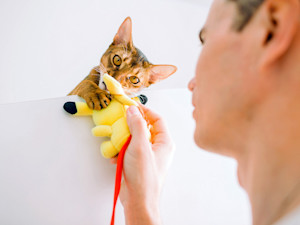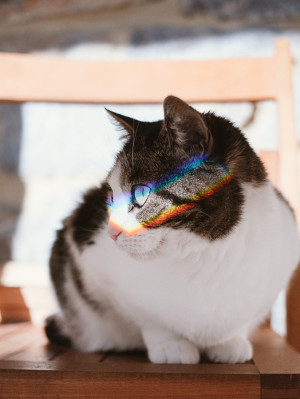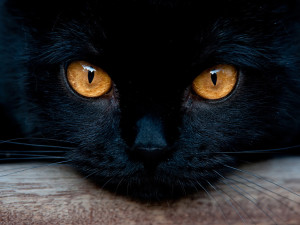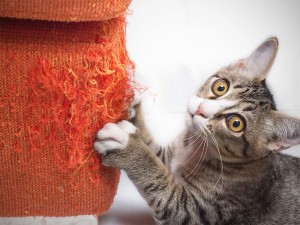Why Your Cat Can’t Stop Watching TV – and What it Means for Their Health
From ‘Cat TV’ to Netflix, discover why your feline is hooked on the screen – and if it’s actually good for them
You’ve finally settled down after a long day with your favourite snack and the show you’ve been dying to watch, or you’ve found the perfect series on Netflix to enjoy with a cup of coffee on a Sunday morning. But a couple of minutes in, your cat strolls over and plops down right in front of the screen, seemingly captivated by the action – but also blocking your view.
Sound familiar? Perhaps you’ve turned to playing ‘Cat TV’ on YouTubeopens in new tab – a genre of videos uploaded with feline viewers in mind featuring squirrels, birds or the ever-popular wiggly worms (there’s even a whole dedicated channel called, you guessed it, Cat TVopens in new tab) – to keep your feline entertained. Or, maybe you’re among the 30 percent of pet parents surveyed by Netflixopens in new tab who’ve gone as far as creating an account on the streaming platform just for your cat.
With so many felines showing an unexpected interest in the TV, it raises the question: why do our cats seem to like the TV so much? And, do they actually understand what’s going on? We turned to Dr Anna Foreman, in-house vet at Everypaw Pet Insuranceopens in new tab, to get some expert insights.
Do cats really watch TV?
It might look as though your cat is as engrossed in the latest season of your favourite show as you are, but that’s not exactly the case; the reality is a bit different. “Although a cat may be looking at a TV when it is on and something is playing, cats do not actively watch or understand what is going on on the screen,” says Dr Foreman. “Rather they are engaged by the lights, colours, sounds and moving pictures.”
Cats can’t differentiate between something that’s on a screen and what’s in the room with them, either, she explains. “For example, if they see something fly across the screen – such as a ball in a sports game, or a bird in a nature documentary – their natural hunting instinct will kick in and they will try to catch it.”
This can lead to frustration as they’ll never be able to catch what they see on TV – Dr Foreman compares it to a cat’s futile attempts trying to catch the dot from a laser pointer, a game many cat parents know well.
What do cats actually see on TV?
Cats can’t see as many colours as we do, particularly struggling when it comes to reds and oranges – they’re better with blues, greens and yellows. They see colours with less intensity too, so the image on screen won’t be as vibrant for them as it is for you.
However, what cats lack in colour perception, they make up for with their sensitivity to movement – something that will come as no surprise if you’ve ever seen your cat pounce on fast-moving prey! Images might appear less smooth to them: whilst TV shows and movies look like fluid videos to us, they’re actually made up of still images that flash rapidly one after the other, referred to as the refresh rate, which is measured in hertz (Hz).
Most shows are shot at 24 Hz or 60 Hz to allow us to perceive a TV show or movie as a moving image, but this is far too slow for cats of course, who would probably need at least 100 Hz to see a TV show as a fluid video. This means that your TV might be more of a flickering screen to your cat – which is why cats sometimes enjoy watching newer TVs, as they often have a higher refresh rate.
Meanwhile, cats have better hearing than we do, so the noises and sounds from the TV will be louder for them.
Are there benefits to cats watching TV?
Dr Foreman explains that despite not necessarily knowing what they’re watching, TV can be good mental stimulation for cats. With all the lights, sounds and moving pictures, if a cat is ill or injured and has to rest in a crate – or can’t otherwise get up to their usual antics – cat TV can also help with boredom. “Phones or tablets are particularly useful devices to facilitate this as they can be put at a cat’s level within their enclosure,” suggests Dr Foreman.
However, there can be too much of a good thing, so moderation is key. A cat’s eyes are more sensitive than a human’s, so prolonged exposure to a bright screen may cause discomfort. Think of TV time as a supplement to other cat enrichment activities that you can do together, balancing electronic stimulation with old fashioned playtime such as chasing toys.
Cats might also be scared by sudden loud noises from the TV, or exhibit territorial behaviour if they hear the sounds of other animals, particularly cats. And, as previously mentioned, cats can get frustrated if they’re unable to catch something on the TV. With that in mind, cats should never be left alone with an unsecured television, especially with an un-catchable mouse on the screen, lest you be left with a scene straight out of Tom & Jerry.
What do cats like to watch on TV?
Cats aren’t tuning in to keep up with plot twists or punchlines, but they do tend to prefer shows with fast-moving, prey-like visuals. Nature documentaries featuring small animals or bright-coloured cartoons are often popular with felines. One 2008 study of shelter catsopens in new tab found that a mix of prey-like images and rapid motion helps capture and maintain a cat’s attention.
Interestingly, 12 percent of pet parents have reported turning off shows because their cats didn’t enjoy them – not due to poor plot lines or unlikable characters, but because their cat didn’t seem to like it.
If your cat’s tuning into Tom & Jerry, do they know that Tom is a cat and Jerry is a mouse? Apparently not. Whilst it’s unclear if cats can recognise other cats on TV, Dr Foreman notes that territorial behaviour may be triggered by hearing the sounds of other cats on-screen. However, because scent cannot be transmitted through the television (yet…), the visual presence of another cat alone is unlikely to elicit much of a response.
Netflix’s survey suggests that some pets enjoy watching titles including Stranger Things, Black Mirror and House of Cards with their parents, but how much of this is just wanting to be close to their favourite humans?
Well, next time you’re having a night in with your favourite series, why not pay close attention and check out your cat’s reaction to find out?









